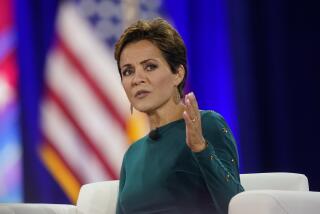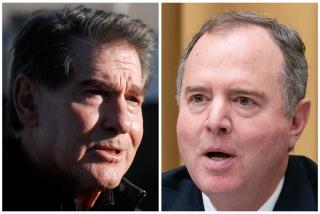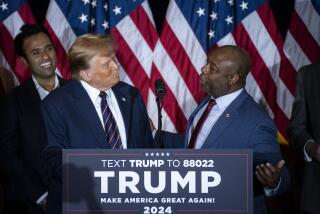McCain surge puts Iraq war at fore
The growing likelihood that Sen. John McCain will win the Republican presidential nomination has sparked renewed debate between the Democratic front-runners over the Iraq war -- and over who possesses the strongest credentials to challenge a war hero for the duties of commander in chief.
The issue provoked one of the sharpest moments in Thursday’s Democratic debate in Los Angeles, as Sen. Hillary Rodham Clinton of New York argued that the party’s eventual nominee would need sufficient “gravitas” to persuade American voters that he or she can be a strong leader while arguing for a withdrawal of U.S. troops from Iraq.
The jousting continued Friday when a top military advisor to Clinton’s rival, Sen. Barack Obama of Illinois, ridiculed Clinton’s implication that she would offer voters the better credentials.
The advisor, retired Gen. Merrill A. “Tony” McPeak, said in a telephone interview that Obama has “real gravitas, not artificially created, focus-grouped, poll-directed, rehearsed gravitas.”
He also said Obama “doesn’t go on television and have crying fits; he isn’t discovering his voice at the age of 60” -- references to Clinton’s much-publicized show of emotion during the New Hampshire primary campaign and her speech after winning the contest in which she declared that she had “found my voice.”
McPeak later retracted his remarks, and the Obama camp disassociated itself from them.
McPeak, who served as Air Force chief of staff under the first President Bush and President Clinton, charged in his initial comments that Clinton’s remark about gravitas was “the kind of lie that has one element of truth.”
“Yes, gravitas is important, but a lot of the rest [of Clinton’s argument] is obfuscation,” he said. “It’s almost like if you say that you have gravitas, you had it from being Bill Clinton’s wife for eight years and Barack Obama had never earned it from his life experience.”
An Obama campaign aide was on the line during the interview. Minutes later, McPeak called back to say he regretted his remarks and that he has “high regard” for Hillary Clinton.
He also expressed concern that “some of those loose-lips-will-sink-ships quotes will be the big story.”
In an email, the Obama campaign said McPeak’s words “crossed the line” and that Obama “strongly disagrees with these comments and apologizes on behalf of the campaign.”
A Clinton spokesman, Phil Singer, called it “unfortunate” that McPeak’s retraction “was motivated out of concern about the political impact of his words as opposed to the fact that they were simply offensive.”
The battle over who best could press the Democratic case on foreign policy is one of the key ways that Obama and Clinton are trying to distinguish themselves as they campaign for convention delegates in Tuesday’s voting in California and more than 20 other states.
Both Clinton and Obama have criticized McCain for his past comments that the United States likely would have to maintain a military presence in Iraq for many years. At Thursday’s debate, both offered assurances that they would start troop withdrawals within the first months of their presidencies.
McCain, a vocal supporter of President Bush’s so-called surge strategy in Iraq, has charged that the Democrats have been pushing a “false argument” in focusing so much attention on removing troops from Iraq.
Noting that the United States has maintained a lengthy military presence in South Korea, he said during a GOP presidential candidate debate Wednesday near Simi Valley that “we are going to be [in Iraq] for some period of time, but it’s American casualties, not American presence” that should be the main concern.
Polls throughout the campaign have shown that Democratic-leaning voters see Clinton as better prepared than Obama to be commander in chief. The survey respondents, even if they disagree with her war vote, also rate her as best equipped to end the war.
But exit polls of voters in states that already have held primaries or caucuses have found that Obama, who was an Illinois state senator in 2002 when he delivered a speech opposing the war, has made up some of that ground. In New Hampshire, Democratic primary voters were split over who they believed was the “strongest leader.”
On Iraq, surveys continue to show strong public opposition to the war -- setting up what many Democrats believe is a winning campaign issue.
But, again based on the polls, McCain, a decorated naval aviator who was a prisoner of war in Vietnam, appears to pose a challenge for the Democrats: The senator from Arizona scores high marks with voters for candor and his decision to back the troop surge, even when it was unpopular.
If security in Iraq continues to improve over what it once was and the Pentagon moves forward with its planned drawdown of troops, public discontent with the war could recede, strengthening McCain’s appeal.
During Thursday’s Democratic debate, Clinton said the party’s nominee must strike the right balance in calling for troop withdrawals while appearing qualified to be commander in chief.
That qualification is a “threshold in the mind of every American voter,” she said.
Obama, while campaigning Friday, pressed his case that Clinton, because of her vote on the war authorization measure, would not strike a strong contrast with McCain.
“If we go [into the general election] suggesting [the war] was just not managed well by George Bush, then Sen. McCain will be able to come back and argue, that” the United States is “now getting it right,” Obama said. He added that such an assertion is “easier for me to dispute” than Clinton.
More to Read
Start your day right
Sign up for Essential California for news, features and recommendations from the L.A. Times and beyond in your inbox six days a week.
You may occasionally receive promotional content from the Los Angeles Times.






